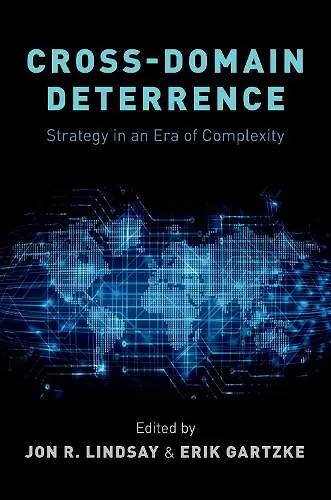Cross-Domain Deterrence
Strategy in an Era of Complexity
Erik Gartzke editor Jon R Lindsay editor
Format:Hardback
Publisher:Oxford University Press Inc
Published:14th Mar '19
Currently unavailable, and unfortunately no date known when it will be back
This hardback is available in another edition too:
- Paperback£48.99(9780190908652)

The complexity of the twenty-first century threat landscape contrasts markedly with the bilateral nuclear bargaining context envisioned by classical deterrence theory. Nuclear and conventional arsenals continue to develop alongside anti-satellite programs, autonomous robotics or drones, cyber operations, biotechnology, and other innovations barely imagined in the early nuclear age. The concept of cross-domain deterrence (CDD) emerged near the end of the George W. Bush administration as policymakers and commanders confronted emerging threats to vital military systems in space and cyberspace. The Pentagon now recognizes five operational environments or so-called domains (land, sea, air, space, and cyberspace), and CDD poses serious problems in practice. In Cross-Domain Deterrence, Erik Gartzke and Jon R. Lindsay assess the theoretical relevance of CDD for the field of International Relations. As a general concept, CDD posits that how actors choose to deter affects the quality of the deterrence they achieve. Contributors to this volume include senior and junior scholars and national security practitioners. Their chapters probe the analytical utility of CDD by examining how differences across, and combinations of, different military and non-military instruments can affect choices and outcomes in coercive policy in historical and contemporary cases.
These strong essays show that cyber, conventional weapons, and diplomacy can be employed in complex mixes. This deeper understanding of how things are likely to unfold should inform scholars, policy-makers, and anyone interested in these fascinating issues of increasing importance. * Robert Jervis, author of How Statesmen Think *
The study of deterrence is back after a post-cold war hiatus. With it comes rising appreciation of how much the deterrence landscape has changed. The nuclear problem is not as central as before; but it remains, deceptively familiar. And military competition has expanded into cyber space and outer space. In recent years, much work has been done on these new dynamics. Some of the best of this work is captured here, and this fine collection makes a compelling case that 'cross domain deterrence' is an organizing concept with enduring value. * Brad Roberts, Director, Center for Global Security Research *
This excellent and unique volume is a must-have for both scholars and practitioners, especially in the face of a rapidly evolving threat environment. * Kimberly Marten, Professor and Chair of Political Science, Barnard College *
This very useful book pulls together scholars confronting the new complexities of cross-domain deterrence, when multiple kinds of attack can now be directed at us, as well as at our adversaries. Essential reading. * George H. Quester, Professor Emeritus of Government and Politics, University of Maryland *
ISBN: 9780190908645
Dimensions: 160mm x 239mm x 25mm
Weight: 726g
410 pages